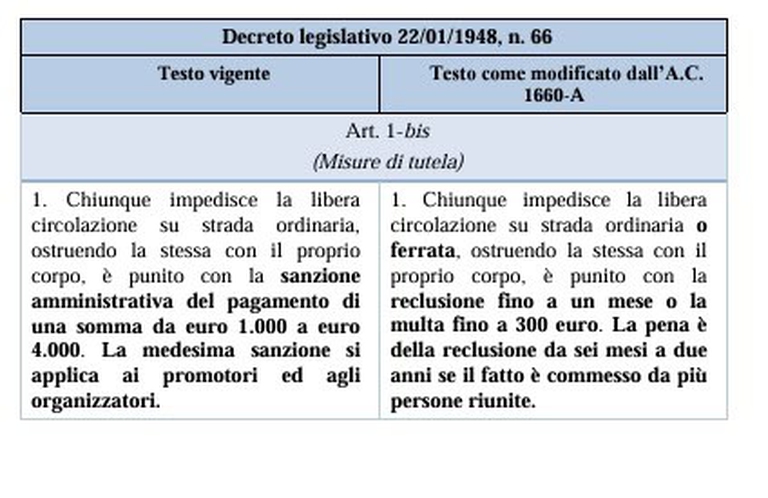https://www.lifegate.it/blocco-stradale-carcere
- |
- The approval of the articles of the Security bill, one of the most discussed provisions of this government, is proceeding apace.
- Among the rules already approved, the one that transforms the road block into a crime punishable by prison of up to 2 years, but only if committed with one's own body.
- The type of crime seems tailor-made for the forms of peaceful protest carried out by climate activists.
Some have renamed it la anti-Gandhi norm.Because it punishes as a crime the non-violent act of protest of blocking traffic on a road or railway with one's body.On the other hand, the one against the roadblock it is nothing more than one of the many rules of a repressive nature that are contained in the so-called Security bill, which is currently under discussion in the Chamber:the text is still waiting to be approved in full by Montecitorio, and will then have to pass through the Senate, but in the meantime the first approval for article 14, which contains the law in question, has already been voted on.
What changes for the roadblock
Soon, therefore, those who block a road or a railway will risk up to a month in prison if they act alone, while the sentence may increase from six months to two years if the action is carried out by several people, as in fact always happens.This rule aims to counter protests that cause significant disruption to traffic, often organized by groups of eco-activists:Precisely the fact that the "objective" of this article is clearly identifiable, however, makes it a highly criticisable rule, not only in substance (is protesting without violence no longer a right?) but also in form, since the laws should have a universal character and not be directed at specific categories of people.Until now the so-called road block, according to a legislative decree of 1948, was considered only as a administrative offence:it was punishable, in short, with fines or seizures, but it was not a crime provided for by the penal code.Article 14 of the Security Bill instead transforms a non-violent action into a real crime.

In recent years, roadblocks have been a favorite means of protest, especially among climate activists, for example Latest Generation or Extinction Rebellion, who have made extensive use of it in Milan, Rome and many other Italian cities.Just over the past weekend, for example, the road blockade of the A12 motorway by Extinction Rebellion took place, to ask for "a stop to public subsidies for fossil fuel companies".The activists in question do not yet risk prison, since the law is not yet in force, but in the very near future they will.“The Security bill is galloping towards its final approval” warned the activists of the Last Generation – One thing is very clear:for this government "security" means punishing political opponents and those who live in a state of social and economic marginality.They are destroying the freedom to protest."
A rule practically "contra personam"
Those who will be able to continue to protest peacefully will be those who will implement the same road blocks not simply with their own bodies but with other means, for example tractors as happened in recent months when protesting (with European policies) they were the farmers.Hence the suspicion of many:do you want to target the road block in a general sense, or is it an ad personam rule (or perhaps it would be better to say "contra personam") to target only one category of demonstrators?
Even before the summer break, in the Commission the Chamber had approved an amendment to the Security bill renamed "No Bridge", because it seemed expressly aimed at stopping or punishing activists who intended to oppose the construction of the Bridge over the Strait of Messina, one of the key projects of the current Italian government (but the amendment also lends itself well to the Piedmontese No Tav, for example):the amendment in question provided an increase in sentence one third compared to what is foreseen for those who commit violence or threats during a demonstration if "the violence or threat is committed with the aim of preventing the construction of a public work or strategic infrastructure”.
